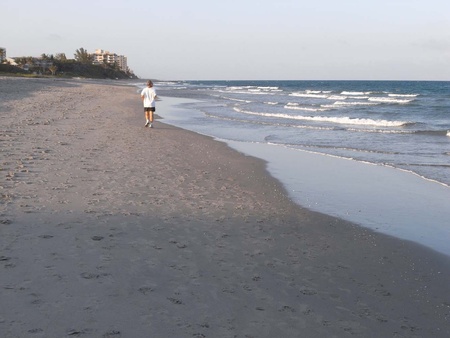Morikami Sukeji, who traveled to America as a member of the Yamato Colony in South Florida and remained there alone until the end of his life after the colony was disbanded, continued to write letters to his sister-in-law and her family, whose husband (Sukeji's younger brother) had died after the war. He reports that in 1968 he was living a settled life, close to nature, as if he had been able to let go of something after becoming an American citizen the previous year. However, he also boasts that life is a series of dreams, and that life without dreams is meaningless, and shows how he is working desperately to create the farm of his dreams, which he has been devoting himself to for the past few years.
* * * * *
<Send me the Miyazu newspaper>
January 1, 1968
Aki-chan (niece), how are you feeling? When you go to Miyazu, please ask the city hall or the chamber of commerce if there is a newspaper in Miyazu. No matter how many years pass, I miss my hometown. There used to be a really good newspaper called Kitakinki, and I enjoyed reading it more than anything.
After the magazine went out of print, I lost all news from my hometown. If there was any, I would have received a weekly newsletter, or every issue if it was a weekly magazine.
Airmail is expensive. It takes more than a month to arrive. If the package is not wrapped very securely, it will fall apart before it arrives.
There's nothing unusual here. Maybe it's because I've been resting, but my leg seems to be a little better. Be careful not to catch a cold.
"The world has changed and we live in a self-centered age."
March 21, 1968
Dear Reiko (niece), thank you for your letter the other day. I am extremely grateful for your heartfelt congratulations on my naturalization.
Reiko-san, the world has changed. We are now in a self-centered age. No matter how much I owe someone, there is no one who even sends me a New Year's card once a year. On the other hand, this country (America) has taken care of me for a long time. I want to do everything I can. I currently live in a field on the outskirts of the city with my three cats.
I'm busy, so I'm not lonely, but the problem is that I have a chronic condition that constantly hurts my joints, and sometimes I can't walk or move my hands. Fortunately, I have kind friends nearby, which is a big help. There are so many things I want to say, but people are people, so I've decided to forget about the past. Goodbye, Uncle.
"I've retreated to the countryside and am enjoying peace of mind."
May 10, 1968
Dear Mi-san (sister-in-law), I received your letter the other day. I have caught the flu so I am late in replying. Reiko wants to go to the US, but I cannot recommend it. It is easy to travel to the US, but you cannot stay for more than six months, and working is prohibited under any circumstances. This country has changed, and it is no longer a paradise. Moreover, I myself have changed, and I hate noisy things more than anything. I have retreated to the countryside and am enjoying the quiet nature.
Living alone can sometimes feel lonely, but I am able to spend my days carefree and without any worries. Perhaps it is because of my age, but I have become short-tempered and irritable.
"I miss the mountains because I've been looking at the sea all this time."
August 1968
Mi-san, how are you feeling? Even if you're resting, I'm sure it's sweltering in the summer in Kyoto. I'm almost completely recovered, so I'm going out to the fields to get some exercise. Yesterday was Sunday. I spent the day reading the Miyazu Newspaper that you sent me. No one came to visit, and I didn't say a word all day. If I had a cat, I'd have someone to talk to. But I have a radio and a TV, so I don't feel lonely.
The prostitution in Japan is worse than in this country. How should we deal with the sexual problems of young people in particular? If parents of children of this age are not very careful, irreparable damage can occur. They should not be too strict, but they should also not be allowed to do as they please. I think there is no other way than to provide thorough sex education.
People who live far from the sea wish they had the sea more than anything, but for those like me who always look at the sea, I miss the mountains more than anything. Yesterday was a hot day with little wind. For those who are used to the heat, anything over 100 degrees (about 38 degrees) is tough.
This morning I'm going to the fields to sow seeds of tometau, pepper, eggplant, etc. These are all seedbeds for sale.
Take care of yourself. Nothing in life goes as you want it to. Don't dwell on the past, live in the present.
(Maybe because he has naturalized, I haven't heard from him.)
October 14, 1968
Thank you for your letter, Mi-san. Nothing has changed here. I have hardly heard from anyone in Japan, probably because I have become a naturalized citizen and am no longer needed. I am completely alone, but fortunately I have kind friends who come to visit me, so I don't feel lonely.
It's been raining a lot this summer and it's been a pain. The other day I was invited to dinner by a friend and I happened to meet two young Japanese people (a man and a woman). They both spoke English well and looked good. They were staying here for about a year for sightseeing.
Last night, I was invited to another friend's birthday party and was treated to fried chicken. There have been no typhoons this summer, and the weather has been cloudy and cool. The other day, a friend in Washington sent me some Japanese food. It was rare, and I'd never seen or tasted anything like it before.
There's a lot of Japanese stuff in Washington. The sky is high and the horses are fat, so be careful not to eat too much. Goodbye.
<Tasting Japanese persimmons for the first time in a long time>
October 21, 1968
Dear Mi-san, I received your letter. I'm still the same. It's been a lot cooler here too, so it's a great relief. The typhoon disaster was terrible. Florida was hit several times, but fortunately we were safe here.
There is no one who doesn't think of their hometown. I have no free time. Now, the dream of 60 years ago is on its way to being realized, and I can't think of anything else until it is completed. To tell the truth, I am desperate right now. People laugh at me and say I'm stupid...no one can understand how I feel. Life is a dream. A series of dreams. A life without dreams is completely meaningless.
I am still working hard and dreaming about what I will achieve in the next 20 years. I will be 81 in a few days. My best friend and his wife are going to celebrate with me.
I don't know why, but I haven't been reading much lately. I stopped subscribing to Japanese magazines and Japanese newspapers, and now I only read local newspapers and a few agricultural magazines. I only get occasional letters from you and Mr. XX from Japan.
Today, I tasted Japanese persimmons for the first time in a while. They were made by a friend, so they were a little smaller than the ones in Japan, but the taste was perfect.
I don't have anything else to write, so I'll stop writing. My index finger still hurts and I can't write as well as I'd like. Goodbye.
(Both happy and sad)
November 17, 1968
Thank you for your birthday greeting cards, Mi-san and Aki-chan. To be honest, it's not a New Year's song by Ikkyu-san, but it's both happy and sad. How happy would it be if humans lived forever? I don't believe in the afterlife, so sometimes I think about foolish things.
A friend invited me to dinner and treated me to my favorite shrimp and beef steak. Recently, it has suddenly become cooler, and I want a blanket at night. The number of people coming from the north to escape the cold has suddenly increased, and the city and the highways are extremely crowded.
Like Japan, the economy here is still booming, but there is a shortage of essential cash, interest rates are rising, and it is difficult to borrow money. This year, the weather has been unstable and it rained all summer, so the peach blossoms that bloom in February are now in full bloom, but there is no telling what will happen at any time. I've been feeling sick since this morning, and my lower abdomen hurts, so I couldn't do anything and I spent the whole day sleeping.
(Titles omitted)
© 2020 Ryusuke Kawai







